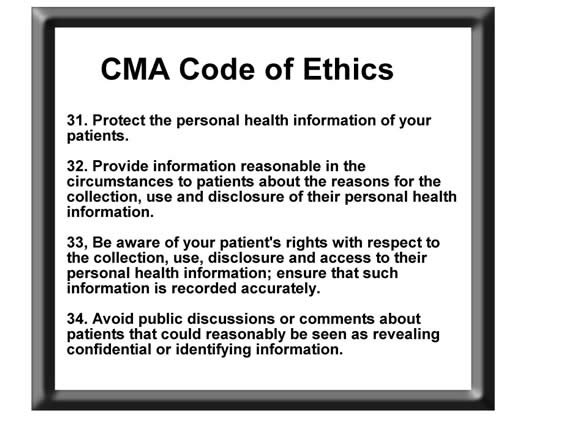Communication
Confidentiality
Information given by patients to HCPs is personal and therefore confidential. To be able to make a proper diagnosis and recommend treatment, accurate factual information must be obtained. Patients are unlikely to give this information if confidentiality cannot be guaranteed.
Confidentiality allows patients to be completely open with their HCPs when giving their medical histories and in explaining symptoms.
Patients must specifically consent to disclosure of information about their health care before a treating HCP is free to discuss that information with anyone, including the patient’s family. Patients should expect that information will not be revealed to third parties without their permission.
There is a duty on doctors to respect the confidentiality of all the information that they obtain about their patients.
This ethical obligation is also required by statute and by common law.
McInerney v. MacDonald, [1992] 2 S.C.R. 138
The legal duty of confidentiality was acknowledged in this case.
A patient requested that her doctor give her copies of the contents of her complete medical file. The doctor gave her copies of all notes and reports she had prepared herself but refused to produce copies of consultants' reports and records she had received from other physicians who had previously treated the patient, stating that they were the property of those physicians and that it would be unethical for her to release them. She suggested to her patient that she contact the other physicians for release of their records. The patient's application in the Court of Queen's Bench for an order directing her doctor to provide a copy of her entire medical file was granted.
This case was about patient access to their own medical records and the duty of confidentiality.
"The physician‑patient relationship is fiduciary in nature and certain duties arise from that special relationship of trust and confidence. These include the duties of the doctor to act with utmost good faith and loyalty, to hold information received from or about a patient in confidence, and to make proper disclosure of information to the patient."
Physicians’ obligations regarding patient confidentiality are also set out in:
- legislation that governs physicians in each province
- rules of each provincial regulatory body
- codes of ethics or conduct that govern physicians’ associations.
The content of a patient’s medical record may not be divulged except in specific circumstances. These include:
- Communication to another HCP, who needs to know information in the patient's medical record in order to give effective therapy.
- Legal authority for disclosure
- subpoena
- reportable disease
- child abuse
- On the consent of the patient to a third party
- implicitly (as to a paying agency)
- explicitly to a lawyer or insurance company
Medical information may only be shared with family members with the patient’s consent. Disclosure of information to a patient’s immediate family without consent could result in a finding of professional misconduct by the appropriate regulatory body


